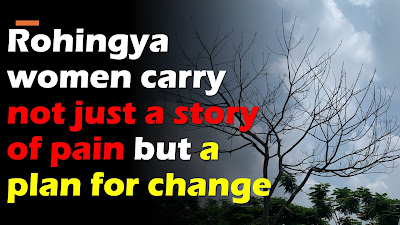
Displaced Rohingya women demand equal access to health, gender rights amid global SDG promises
Despite global commitments to achieve health for all and gender equality by 2030, displaced Rohingya women and girls remain locked out of meaningful progress,
the Education Policy and Equity Specialist with the Rohingya Maìyafuìnor Collaborative Network, Noor Fatima, has warned.
Speaking at the Sexual Health with Equity & Rights, (SHE & Rights) session during the International Conference on Family Planning (ICFP) 2025, the young Rohingya advocate, Noor, said health and gender programmes often bypass the most vulnerable, particularly Rohingya women and girls, leaving their rights to health and wellbeing delayed, or outright denied.
“In the Rohingya refugee communities, the progress on Sustainable Development Goal 3 (health and wellbeing) and Goal 5 (gender equality) has been deeply uneven and fragile, there have been small but significant steps forward.
“We now see more young people speaking up on awareness sessions, giving us the chance to finally share our lived experiences. But the truth is, this progress is slow and far from equal. It often does not reach the most vulnerable especially young Rohingya women and girls. For many of us, health and wellbeing are not just delayed rights but they are denied rights,” Noor said.
Nigeria Health Times reports that Rohingya women are women from the Rohingya ethnic minority group, a predominantly Muslim community that has faced decades of persecution and displacement, mainly in Myanmar’s Rakhine State.
Myanmar (formerly Burma) does not officially recognize them as citizens, rendering them stateless under the 1982 Citizenship Law.
Most Rohingya women live in refugee camps in Bangladesh (especially Cox’s Bazar, the world’s largest refugee settlement), while others are scattered across India, Malaysia, Indonesia, and the Middle East.
She highlighted the multiple barriers refugee women face in accessing health care, ranging from lack of documents and language hurdles to fear of being turned away from clinics.
Noor noted that many pregnant women go through entire pregnancies without medical care, while young people suffer from preventable diseases in silence.
“Most refugee girls grow up without structured knowledge of their bodies, reproductive health or mental wellbeing,” she explained. “Menstruation is treated as shameful, mental health is ignored, and gender-based violence is barely discussed, not because we don’t care, but because the system never cared about us.”
While governments pledged that “no one will be left behind” in the global development agenda, Noorinsisted that Rohingya women are still denied equal protection, education, and leadership opportunities.
“When daily survival is a struggle, wellbeing becomes a distant dream,” she said, stressing that refugee women are yet to be treated as full citizens worthy of protection and participation.
Despite the systemic neglect, Noor said young Rohingya women are building their own solutions. Through the Rohingya Women’s Collaborative Network, women have created safe spaces for open discussions, trauma healing circles, digital literacy programmes, and training for young women as community health advocates.
“These are not just programmes,” she said. “They are acts of survival, resilience and hope, women-led, Rohingya-women led, run by those who lived through these struggles.”
Noor urged global actors to move beyond tokenism in youth engagement and instead invest directly in youth-led initiatives.
She criticised the current funding model, which channels money through large agencies while grassroots groups survive on volunteer labour.
“We need to upgrade youth engagement from participation to influencing policies,” she argued. “Governments, UN agencies and others must involve refugee and marginalised youth from designing programmes to monitoring budgets.”
She also pressed for alternative education pathways for stateless refugees, many of whom dream of becoming health and legal professionals but are blocked by lack of documents or scholarships.
Challenging the narrative that portrays Rohingya youth only as victims, Noor emphasised that her community holds strategies and solutions that deserve recognition and support.
“We are not just survivors, we are also strategists, innovators and leaders,” she said. “Every woman I work with carries not just a story of pain, but a plan for change. If the world truly believes in the SDGs, then stop standing above us. Stand beside us, share decision-making, fund our leadership and protect our spaces.”
The ICFP 2025 was hosted by Global Center for Health Diplomacy and Inclusion (CeHDI), Y+ Global (Global network of young people living with HIV), Y-PEER Asia Pacific, Asia Indigenous Youth Platform (AIYP), Youth Lead Voices, International Conference on Family Planning (ICFP) 2025, Family Planning News Network (FPNN), International Planned Parenthood Federation (IPPF), Asian-Pacific Resource and Research Centre for Women (ARROW), Women’s Global Network for Reproductive Rights (WGNRR), Asia Pacific Media Alliance for Health and Development (APCAT Media) and CNS.